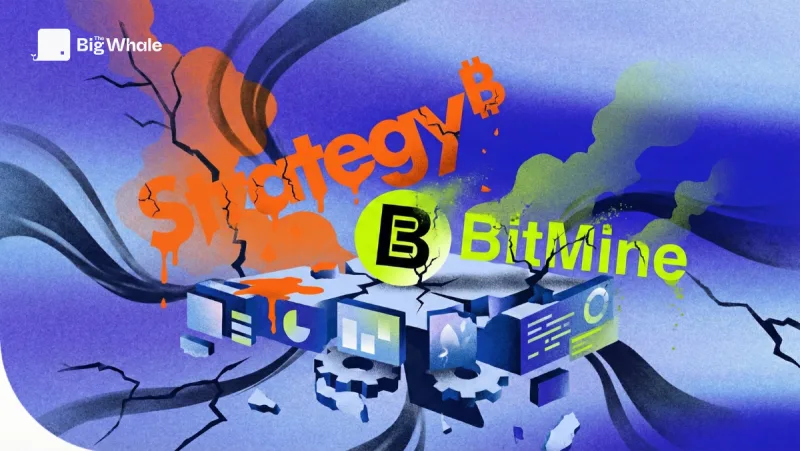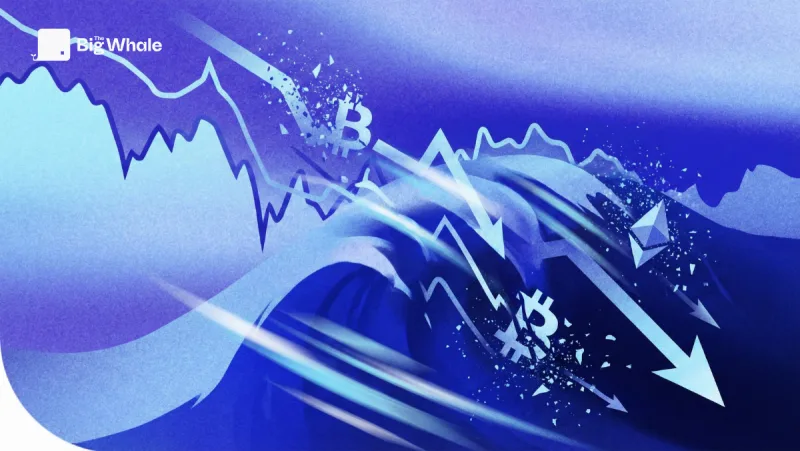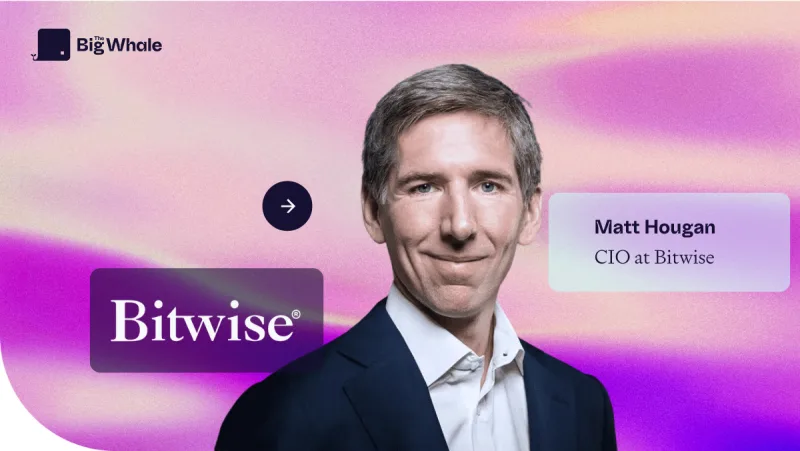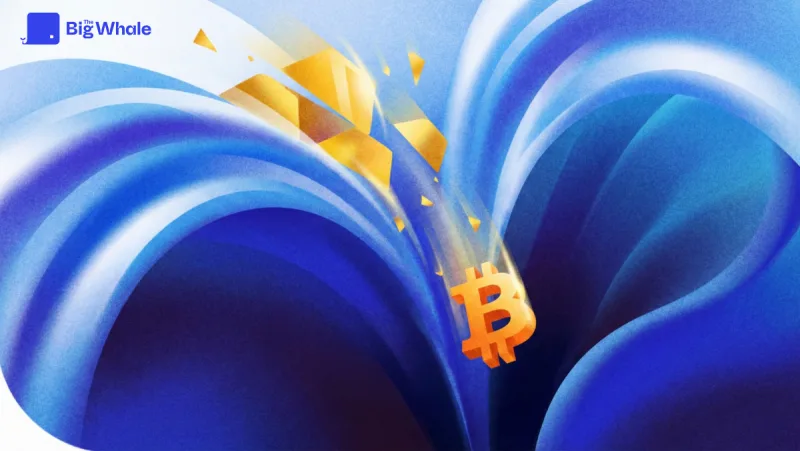TBW - Charles Hoskinson: "Ethereum refuses on-chain governance, it's not a healthy situation"
"Ethereum refuses on-chain governance, it's not a healthy situation"

What's the reason for your visit to Paris?
I've been invited to Paris Blockchain Week several times in recent years. There's a great blockchain community here, but I'd never had the time to attend. So this is my first time. It was a very successful event: 10,000 people in attendance, some great companies in France.
From our side, we are both an engineering company and a university company. On the academic side, we carry out a lot of academic research, particularly on formal methods and the theory of programming languages. We have laboratories at Stanford, the University of Edinburgh, the Tokyo Institute of Technology and elsewhere. Paris is no stranger to us, especially through its academic excellence: at the Sorbonne, researchers like Xavier Leroy are doing incredible work.
When we think of Paris, we therefore think first and foremost of programming languages, research, not so much cryptocurrencies. Besides, apart from Tezos launched by Arthur Breitman and Nomadic Labs, there are few French crypto projects that have made it into the global top 10. France has always flirted a little with the idea of being crypto-friendly, without really having found its positioning. But Paris Blockchain Week is growing every year, so I decided to finally come and speak here.
Can you name some good French crypto companies?
Yes, of course. There's always some French involvement because there are some excellent engineers and scientists here. But the problem is that the economic environment is not very favourable to start-ups: they often start here and then move elsewhere. Ledger is a success story, as is Tezos, which has a French structure with Nomadic Labs. But as far as Cardano is concerned, no, we don't have a direct presence in France. The closest is our presence in Switzerland, particularly in Geneva.
Would you be interested in launching a structure in France?
Yes... if taxes were lower! (laughs) You know, money isn't really the issue, but I'd much rather give that money to my own government.
"There have been 260 kidnap and ransom incidents in the crypto world in the last 10 years"
I saw you were surrounded by a lot of people. Are they all bodyguards?
No, not all of them. Some of them are part of the 'advance' team, they look after the logistics, like checking us into hotels, organising drivers for our trips, because we have very tight schedules: seven interviews, two keynotes, lots of activities. They prepare the venues in advance so that everything runs smoothly. Of course, a few of them are bodyguards and others are medical assistants, just in case something happens to me.
It has to be said that key figures in the ecosystem are prime targets...
There have been 260 kidnap and ransom incidents in the crypto world in the last ten years. It's common in countries like Ukraine, Russia, France, Germany and even in the US, including New York. People know that in crypto, some people have a lot of money, and it's tempting.
Do you have any security measures in place to prevent this?
Yes, of course. But if I talked about it here, it wouldn't be very safe anymore, would it?
What do you think of the current crypto market?
The market is going up, as it always has. I've been in the industry for a long time: I knew Bitcoin at less than a dollar! It went up to 30 dollars, came back down to 4, went up to 250, then 1200, then 20,000, and so on. When you have that kind of experience, volatility no longer affects you. It's mainly the young people in the crypto space who panic during downturns. What interests me are the fundamentals: are we gaining users? Are we gaining transaction volume?
Today, there are 600 million people in crypto, whereas there were less than 100,000 when I started. Entire countries are embracing crypto. Vietnam, for example: a third of the population owns cryptos. In Argentina, a seventh of GDP is in stablecoins. If you look at the long-term trend, everything is going in the right direction.
What do you think are the biggest dangers in crypto today?
I think the existential risks have largely been resolved. Today, the real question is more philosophical: what does crypto want to become as it grows? On one side you have DeFi, on the other traditional finance (TradFi). Eventually, there will be a merger, like the newspaper industry saw in the 1990s between paper and digital. But we still don't know what this merger will look like. Will it be dominated by regulated intermediaries, like BlackRock with its ETFs, or by Satoshi's vision of everyone holding their assets in self-preservation?
Personally, I prefer the second option, but in reality it will be a mixture of the two, varying according to country, age and level of trust in institutions. For example, in Argentina, people prefer self-preservation because they don't trust their currency or their government. Conversely, in Japan, people are more inclined to use institutional intermediaries.
Are you really sure there are no more risks? The biggest hack in the history of the sector took place at the end of February with the Bybit hack ($1.4 billion)...
Of course, there are still risks. But they are no longer death risks for crypto. With crypto, the collapse of FTX would have been the equivalent of JPMorgan collapsing into the traditional banking system - an absolute cataclysm - yet we recovered in less than a year, without any public bailout. The overall transparency of the crypto market makes us more resilient.
The real dangers come from misuse: money laundering, circumventing sanctions, etc. That said, paradoxically, crypto can also reduce systemic risks. Look at 2008: if Wall Street had had a transparent global market like blockchain, we would have seen the crisis coming. In traditional finance, risk fragmentation kills.
"Cardano has never been so solid"
What do you think of the European regulatory framework, particularly MiCA?
There's an old saying: America innovates, Asia imitates, Europe regulates. MiCA is predictable regulation: it aims for stability and protects existing players. But it's never just "MiCA": it's MiCA + France, MiCA + Germany, MiCA + Malta, because each country applies its own national rules. This limits the effectiveness of the European passport.
MiCA at least provides a clear framework, which avoids grey areas where it is impossible to operate. However, it imposes high compliance costs and unnecessary bans, such as on private currencies. In short, it's a compromise: not perfect, but manageable. At Cardano, we work with this reality, without too many problems.
Where is Cardano's development today?
Cardano has never been so solid. We made three major bets: firstly on the consensus engine, Ouroboros, a highly respected and highly cited protocol. It has been running 24/7 for seven years without interruption. Second, on the accounting model: we improved Bitcoin's UTXO model to add programmability while maintaining a more reliable structure than traditional accounts.
Finally, we invested heavily in on-chain governance: creating a constitution, electing representatives, managing an annual budget - all without a central entity. After ten years' work, Cardano is a complete system, with three million users, $20 billion in value and more than 200 exchange platforms.
Are you satisfied with current on-chain activity?
It depends how you measure. More than 70% of Cardano staking is delegated, which represents around $14 billion. That's huge. In terms of DeFi, we're still small compared to Ethereum or Solana, because our smart contract environment has only been around for three years. The blocks are filled to 20-30% of capacity, so there's room to grow.
What's important to me is the momentum: every year we see an increase in transaction volume, TVL, the number of applications deployed and wallets installed. With our $1.5 billion cash position, the community can now invest to accelerate this growth in a decentralised way.
"Despite its limitations, Bitcoin inspires a whole ecosystem of innovation"
What's your take on Bitcoin today?
Bitcoin holds a very special place in our hearts. What's fascinating about Bitcoin is that it's an extremely restricted system: there are very few things you can do with it, and yet it's precisely this rarity that forces ingenuity. For example, all the advances like Lightning Network, Taproot, or layer 2 solutions come from a protocol that, in theory, shouldn't even allow these kinds of extensions.
It's comparable to the story of the Hubble telescope: it had a defect in its lenses, and yet engineers managed to repair the instrument in space by adding a kind of "contact lens", when it seemed impossible. With Bitcoin, it's a bit the same: it's like writing a video game on an old Nintendo console in assembler, with enormous constraints, but managing to create something magnificent like Super Mario Bros 3. It's this magic of constraint that makes Bitcoin so fascinating.
And today, despite its limitations, Bitcoin inspires a whole ecosystem of innovation, with concepts like sidechains, Bitcoin rollups, UTXO-compatible DeFi applications. This ongoing ingenuity around Bitcoin, despite its very limited scripting language, is what makes this asset so special, so alive. That's why we're also working to make Cardano very compatible with Bitcoin - because, at heart, we share the same technical roots.
What do you think of Babylon and Starknet's new vision of seeking to connect to Bitcoin?
Babylon is run by researchers we know well. Our lab at Stanford, headed by David Tse, is very involved in their work. Babylon offers elegant solutions for securing networks via Bitcoin. We are also working with Fargate and BitVMX to connect Cardano to Bitcoin and other UTXO blockchains. The idea is to have a kind of 'universal adapter', like Node.js for the web. With Bitcoin, there is this beauty of rarity: very few operations are possible, which requires extremely creative engineering.
>> Read our fundamental analysis of Babylon
As co-founder of Ethereum, how do you view the project today?
Ethereum made some major design mistakes, particularly on scalability. To correct this, they have relied heavily on "layer 2s", but these are very parasitic: they absorb Ethereum's liquidity without really strengthening it. What's more, Ethereum has rejected the idea of on-chain governance. Vitalik is therefore forced to play the role of centralised leader, which runs counter to the ideals of decentralisation. This is not a healthy situation.
We have built Cardano differently to avoid this: decentralised governance, symbiotic partnerships with secondary chains. I want Ethereum to succeed - for the entire industry - but its future is uncertain, just like many older technologies that eventually decline despite their initial success.
>> Ethereum: what's the big deal?
"From a business point of view, Solana's team has shown impressive resilience"
In your opinion, who are the brightest minds in the crypto world today?
It depends a lot on what you mean by "bright": there's academic intelligence, business acumen, marketing ability or political savvy. If I had to mention a few names, I'd start with Dan Boneh from Stanford, an exceptional researcher whose every publication moves the whole sector forward. Vitalik Buterin is also impressive: he has managed to be an engineer, a scientist, an ecosystem leader and a public figure all at the same time, which is extremely difficult, especially under so much criticism. I also have a great deal of admiration for Silvio Micali d'Algorand. Usually, after winning a Turing or Fields Medal, you rest on your laurels. He, on the contrary, launched himself as an entrepreneur and continued to do high-level research.
From a business point of view, Solana's team showed impressive resilience in detaching itself from FTX's influence after its fall and bouncing back, which is very rare in our industry. I also have a great deal of respect for Adam Back of Blockstream, one of the fathers of proof of work, even if he can be a little rough in his human relations. Finally, although it may come as a surprise, I think Donald Trump has been able to keep his promises to crypto as president, which is extremely rare in politics.
Trump mentioned your ADA token as a potential asset for the US National Reserve. Do you know why?
Frankly, no! (laughs) One morning, I woke up to 150 congratulatory messages. ADA had jumped 71% and I had no idea why! I never spoke to them about it. My advice would have been simple: start with Bitcoin, which the US government already owns via judicial seizures, and then build a crypto index, like Coinbase or Bitwise do, to provide transparency and balance. The fact that some cryptos have been chosen without public criteria has created a lot of suspicion. But for our part, we had no official contact with the campaign.
Really?
Actually, I almost did. Dave Bailey, who is organising the Bitcoin 2024 conference, had invited me to meet Trump at the event, but I was already travelling to Argentina to meet financial officials there. Some of my friends have met him. And what's striking is that Trump has done exactly what he promised: freed Ross Ulbricht, appointed a "crypto czar", created a national Bitcoin reserve, fired Gary Gensler... Usually, politicians promise a lot and do little. Here, he has kept his word.
>> Trump and the US formalise a 100% Bitcoin reserve
"My usefulness is far greater in the Senate than in the White House"
You were tipped to attend the White House crypto summit on 7 March. Would you have liked to have attended?
No, not at all. For me, it was mainly a communications operation, an event for the photos. But I'm a very philosophical person: I like the slow pace of the legislative process, like a good wine that has been left to breathe. The president may sign laws, but it's the legislators who write them, and those laws will govern us for decades - like the Securities Exchange Act of 1933, which is still in force today.
So the real work is done in Congress, with senators like Tim Scott or representatives like French Hill. That's where we need to discuss the definition of a commodity, a financial security, non-financial use cases, applications in medicine or defence.
The role of the White House is more to provide impetus, to set an agenda. Trump, for example, has said, "We need to fix the structure of the crypto market." But he won't dictate whether the solution is way 7 or way 11 out of 14 possible ways. He will simply sign the legislation into law. So the White House crypto summit was more about image than substance. I would have been there just to appear in an official photo. My usefulness is much greater in the Senate, discussing the substance of the laws that will structure us for the next fifty years.
What is your opinion on the $TRUMP and political memecoins?
I think that $TRUMP, however far-fetched it may seem, reflects an important reality: our political system does not reward excellence. A politician who doubles GDP or transforms education is paid as much as one who fails. In the private sector, performance is rewarded - so why not in politics? Initiatives like $TRUMP, by introducing market mechanisms to measure political influence, are at least forcing a debate. It may sound chaotic, but our current system is so dysfunctional that we need to shake things up if we are to have any hope of reform.
Vitalik Buterin believes that political memecoins are dangerous for democracy. How do you respond?
In my opinion, this is naive and shows a lack of political experience. I've never seen a single political system without corruption. What Trump is doing with his initiatives like the $TRUMP is exposing a reality that has already existed for a long time. Trump doesn't create corruption, he makes it visible. Look at Nancy Pelosi and her insider trading business, or Kelly Loeffler, who after attending a confidential briefing on Covid immediately sold her shares.
These practices have always existed, but they were done discreetly, in the shadows, with the help of lobbyists, far from the public eye. Trump has this unique ability to expose the hypocrisies and failings of the system. And once we see them, we can finally have an adult conversation about how to correct them. Personally, I'd much rather see politicians rewarded for good results - a better education system, a growing GDP, good roads - than continue with the current system where those who are destroying the country get rich anyway. So memecoins like $TRUMP are not a threat to democracy: they simply force society to face up to what it wanted to ignore.
How do you judge the behaviour of the US crypto industry towards Trump?
It's like we've been released from a prison camp. Under Biden, the strategy was simple: sue everything, ban everything, destroy everything. Coinbase was allowed to go public, only to be sued for exactly what it was allowed to do. It was Kafkaesque. Under Trump, even if there are some quirks, there is a real desire to support the industry. Nobody wants to criticise the man who saved the ecosystem. And no, it's not idolatry, it's recognition for keeping his promises in a hostile environment.
Were you personally afraid of going to jail during this period?
Personally, no, but a lot of my friends, like CZ, were extremely exposed. There was a deliberate strategy to criminalise the entire industry. The banks closed our accounts without explanation, despite years of business relationships. The government sought to blame any crypto transactions on the developers themselves, which is absurd. We survived, but we'll never forget what this administration put us through.



